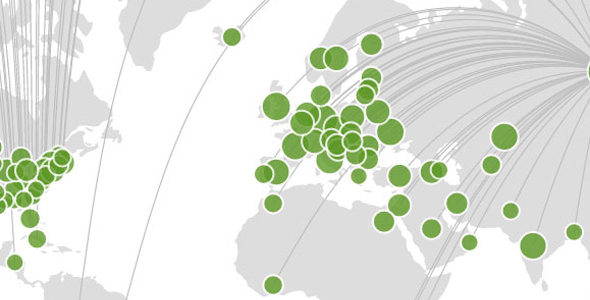In April we marked a year since the University developed a dedicated research marketing team, so we did a review of our activity and want to share some of the highlights with you here.
We have a great portfolio of research to work with, further proven by our fantastic REF score in December. We've also had a huge amount of support from our academic colleagues for which we're extremely grateful.
Web traffic up 89%
Traffic to the University's research web pages has increased by 89% year on year. Our REF results attracted around 10,000 hits, and are some of our most visited research pages. This has been driven by more traffic reaching us through search engines, more referrals to our research content from third party sites, and more effective social media sharing of content.
What's next?
We can see from our analytics that Google+ is decreasing in value, while limited efforts made with Reddit have been successful. Going forward our social strategy will take this into account. We can also see that referrals from Wikipedia are pushing traffic to our research content, so a programme of work to add more links to our research from Wikipedia is now being planned.
Press coverage totalling 8,428 items
Over the last 12 months, our press team has issued 131 press releases, and 49 media alerts. This has resulted in 8428 different appearances in external media. 910 of these were in national media and 3372 were in international media. If we were to pay for this much airtime or column space, it would have cost us over £3m.
What's next?
An editorial board has been established to ensure a rolling 12-month pipeline of research news items. We can see that focusing on specific issues generates profile for Bath, a recent example being the General Election, so we're planning more campaigns like this. We're also working closely with our Development and Alumni Relations team to support activity around the University's 50th anniversary.
Over 23,000 hits to our research blog
We launched our research blog, 'Opinion', in April 2014, and have so far added 52 posts. Posts are bylined by our academics and reflect the news of the day. We had 23,214 hits to the blog over a 12 month period.
What's next?
The Opinion blog is doing really well, so now we're trying to encourage our regular contributors to start their own, research-theme-specific blogs, among their groups. We can help get them started and they can use the blogs.bath.ac.uk platform.
Reaching international audiences through The Conversation
The University of Bath became a member of The Conversation in January 2015, and has since published 46 articles by 37 different researchers.
What's next?
We're planning our next visit from an editor from The Conversation, likely to be in the sciences or management, for the autumn. We're also running regular sessions with academic colleagues to get them started in writing for the platform.
Supporting the Uni research community
We have run many training and internal research awareness events. Research Rocket attracted 410 members of staff and students. We've since held a number of successful mini 'Research Rocket on Tour' events in the Lime Tree. Along with colleagues in the Researcher Development Unit our team has provided media training and social media training throughout the year. We also developed a social media toolkit.
What's next?
We plan to continue our 'Research Rocket on Tour' events in the autumn, and are looking for research groups wanting to get involved. If you're interested, please get in touch! We also hope to run another Research Rocket event - and this time to open it to the public. We've started to run themed Ignite events, our next is likely to focus on the rugby World Cup. And we're working closely with the Digital team to help develop social media guidelines to support researchers who want to promote their work through digital networks.
An anniversary year
As we approach the University's 50th birthday, we're all thinking about how we can use the anniversary to really celebrate the fantastic research carried out here at Bath. Our team has loads of ideas, but we'd love to hear yours too! Please do comment below with any ideas you might have that will help us make our research visible to national and international audiences.
Thanks!
Respond



